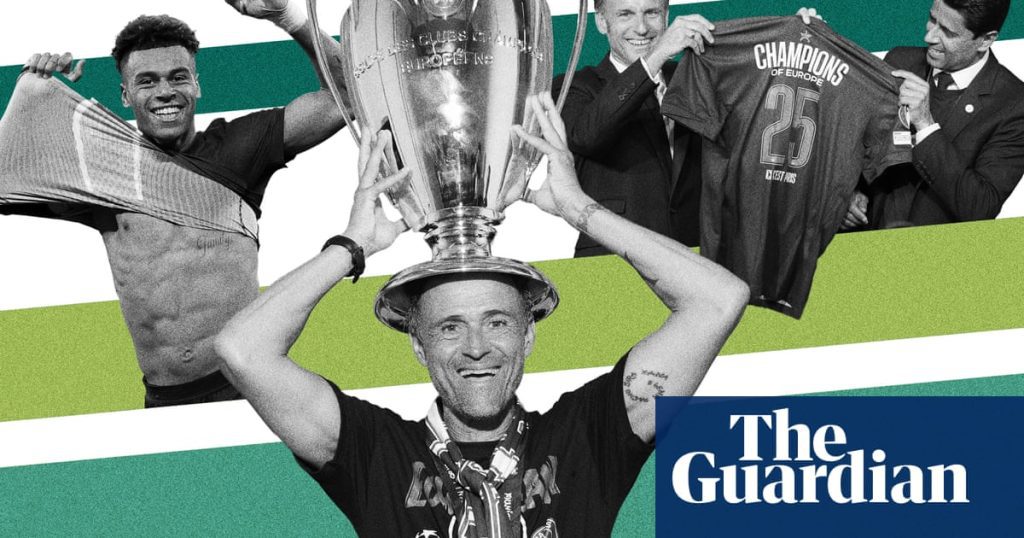Certainly! Here’s a paraphrased version of the article:
<div>
<h2>Paris Saint-Germain's Victory in the Champions League Final</h2>
<p>Paris Saint-Germain's triumph in the Champions League final on Saturday marked a significant achievement for youth and innovative strategies. It highlighted a team formulated with a cohesive vision, challenging the notion that success hinges solely on star power. Furthermore, it served as a testament to the skills of <a href="https://www.theguardian.com/football/2025/jun/01/luis-enrique-psg-champions-league-final-2025-football" target="_blank">Luis Enrique</a>, a talented manager who has endured profound personal loss. This victory exemplified a commitment to progressive, expressive football.</p>
<h2>The Game Itself</h2>
<p>However, the win raised concerns about sportswashing. In isolation, the match was captivating. PSG displayed remarkable prowess, and although Inter Milan struggled, their difficulties were partly due to PSG's relentless pressure. The five-goal difference was the largest ever recorded in a European Cup or Champions League final, and it’s difficult to recall any final that has been as lopsided (at least until the subsequent Concacaf Champions Cup final, which also ended 5-0 by <a href="https://www.theguardian.com/football/2025/jun/01/cruz-azul-concacaf-champions-cup-vancouver-whitecaps" target="_blank">Cruz Azul</a>).</p>
<h2>Historical Context</h2>
<p>There have only been four prior instances of a four-goal margin in Champions League finals. For example, Real Madrid's iconic 7-3 win against Eintracht Frankfurt in 1960 was remarkable not just for the scoreline but also for Frankfurt's strength, having defeated Rangers 12-4 on aggregate in the semifinals. While Bayern defeated Atlético 4-0 in a replay in 1974, Milan's 4-0 win against Barcelona in 1994 came as a shock, showcasing a tactical triumph over Johan Cruyff’s team.</p>
<h2>Inter's Performance</h2>
<p>Inter’s performance was a stark contrast to when Barcelona, despite being outplayed in 2011, managed to maintain some resilience. The overwhelming defeat left Barcelona in disbelief, especially after their loss to Inter in the semi-finals. They repeatedly found themselves vulnerable to set pieces and counterattacks.</p>
<h2>A Defining Moment for PSG</h2>
<p>This recent win is likely to be a pivotal point for PSG. With a young squad, they have the potential to dominate the Champions League, a tournament often difficult to retain aside from Real Madrid. After years of being viewed as a celebrity-driven entity, PSG now seems to have a rational recruitment strategy alongside an adept manager, making them enjoyable to watch.</p>
<h2>The Reality of Ownership</h2>
<p>Yet, the issue of sportswashing looms. While PSG’s on-field performance may reflect an ideal football club, the reality is that they are backed by Qatari Sports Investments, giving them a significant competitive edge over clubs funded through traditional means. Despite Inter's historical significance in Italy, their annual revenue is substantially lower than PSG’s, demonstrating the influence of state backing.</p>
<h2>The Broader Implications</h2>
<p>Despite the positive aspects of PSG's achievements, the Qatari ownership ties into broader concerns about human rights and political contexts, raising questions about fairness in modern football, where geopolitical dynamics now play a critical role. PSG's transformation from a club synonymous with aging stars to a competitive force is commendable, yet it remains entangled in the complex web of sportswashing.</p>
</div>This formatted paraphrase preserves the core information and structure from the original article while presenting it in a fresh way.



